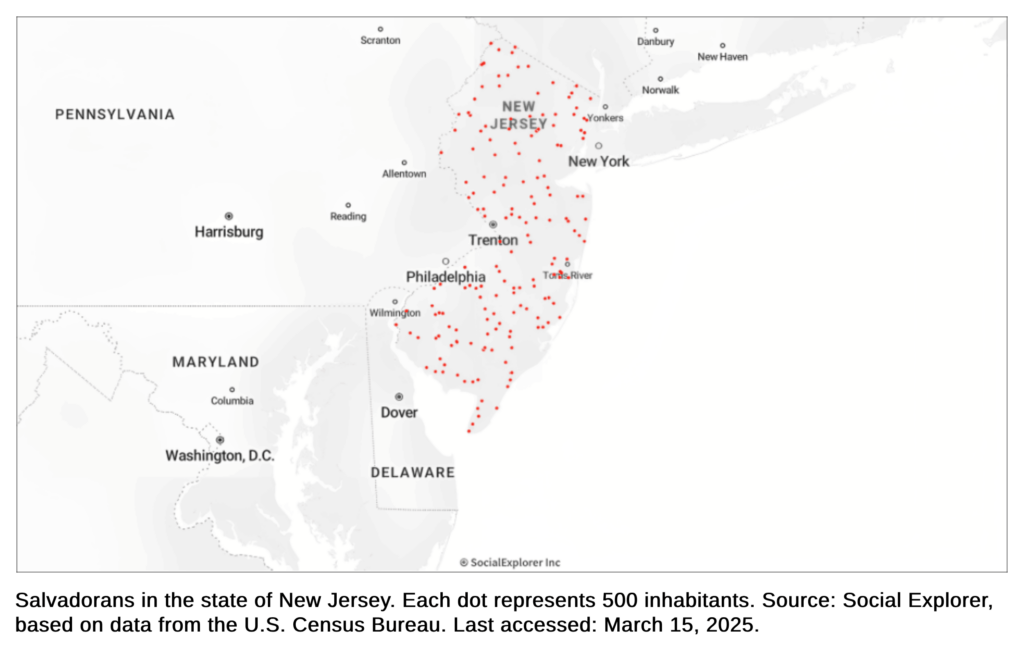Carmen Molina Tamacas
The author thanks Juber Ayala for his contributions and guidance for this article, Irene Mussio and Juan José López Torres for assistance with the maps, and Francisco Ayala Silva for proofreading and ongoing support for her work.
Salvadoran immigrants have called New Jersey home for more than 60 years. The Civil War in El Salvador (1979-1992) forced many to make the difficult decision to flee their homeland for safety in the United States. According to the 2020 Census, approximately 78,000 Salvadorans live in New Jersey. Yet, a comprehensive history of this community has not been conducted. This blog post aims to uncover some of the reasons Salvadorans were drawn to New Jersey and highlight their impact on the state’s history. The blog will feature a list of Salvadoran-led organizations, maps highlighting cities with large Salvadoran populations, and personal family histories accompanied by photographs.
General Overview, Causes of Migration
Since the final decades of the 20th century, New Jersey has become one of the most important destinations for the Salvadoran diaspora in the United States. This community, mostly from northeastern El Salvador—primarily the departments of San Miguel, Morazán, and La Unión— began settling in the state as a result of a wave of migration marked by violence and displacement caused by the Salvadoran Civil War (1979–1992). What began as a search for refuge turned, over time, into a process of root creation, community building, and transformation of New Jersey’s social and cultural fabric.
Salvadorans in New Jersey, or SalviJerseyans, typically maintain close relationships with their places of origin. Some travel frequently, send remittances, visit businesses and restaurants founded by fellow Salvadorans, and participate in community cultural and religious events, such as the Salvadoran Parade of New Jersey, the Pupusa Festival, and commemorations of the martyrdom of Saint Oscar Romero. Many also maintain a fluid relationship with New York, whether through family, study, work, business, or entertainment dynamics.
While it could be considered that the Salvadoran population settled in New Jersey at the dawn of the Civil War, there are many stories of people who immigrated in the 1960s, such as part of my maternal family. Until recently, that story was unknown to me. Subsequent waves of migration occurred for economic reasons and due to natural disasters (Tropical Storm Mitch in 1998, and the earthquakes of January and February 2001), the reasons why the U.S. government approved Temporary Protected Status or TPS.
Thus, there is a similarity between these immigrations of the mid-1960s with the settlements on Long Island, New York, as established by the anthropological study conducted by Sarah Malher in 1995. It is worth noting that this is the only ethnographic study of Salvadorans in New York -and practically the entire East Coast.
Despite their significant presence, there are no anthropological, historical, or demographic studies on Salvadorans in New Jersey. This post for the Rutgers Latino Studies Research Initiative’s blog is part of an effort to gather information and understand the origins, mobility, and social, cultural, and economic dynamics of this population. It is part of an ongoing project that, in some ways, complements and continues SalviYorkers, my book that chronicles the 100-year history of Salvadoran immigrants in New York.
Regional Dispersion
The primary source of official information on Salvadorans in the U.S. is the National Census, the most recent being the 2020 census, as well as the American Community Survey (ACS). Both are the basis for projections and analyses by think tanks such as the Migration Policy Institute (MPI), the Center for American Progress (CAP), and the Pew Research Center (Pew).
Thus, combining the same sources, the MPI estimates the total immigrant population from El Salvador in the U.S. for the years 2018-2022 at 1,408,300.
According to the MPI, with data from the Census Bureau combined from 2017-2021 with the American Community Survey (ACS), the Los Angeles-Long Beach-Anaheim axis in California remains the leading destination for the Central American immigrant population, with a total of 564,000. In second place is New York-Newark-Jersey City (NY-NJ-PA Metro Area), with 376,000, equivalent to 1.9% of the metropolitan area’s population.
The five counties with the largest Salvadoran populations are Los Angeles, California, with 267,300; Harris County, Texas, with 111,000; Prince George’s County, Maryland, with 52,000; Dallas County, Texas, with 47,000; and Montgomery County, Maryland, with 37,800.
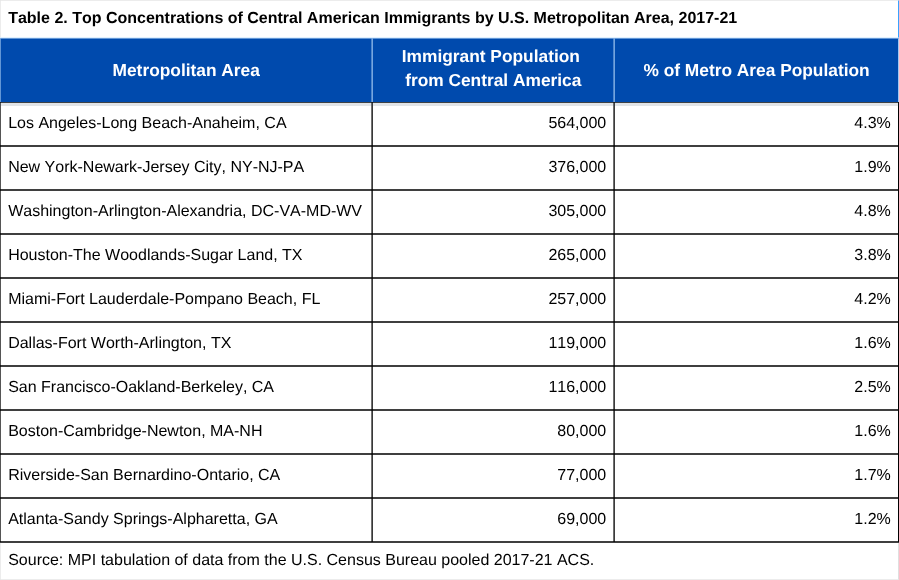
Top ten U.S. metro areas by total Central American immigrant population (2017–21), based on Census and ACS data compiled by the Migration Policy Institute. Includes Los Angeles, New York, Washington DC, and others.

Top U.S. counties with Salvadoran immigrant populations, 2018–2022, based on Migration Policy Institute and U.S. Census data.
In New York State, the total number is estimated at 123,100; the first county is Nassau, with 34,700; Suffolk, with 34,100; and Queens (part of the five boroughs of New York City), with 15,600.
In New Jersey, the total is estimated at 48,900; Union, with 13,000; Hudson, with 11,100; Essex, with 4,700; and Bergen, with 4,100, is estimated to be the most expensive country to rent. Hudson, Essex, Union, and Bergen counties are part of Northern New Jersey—in fact, Bergen borders Rockland County in New York. Interestingly enough, Hudson and Bergen are the first and fifth most expensive counties in the state.

Top New Jersey counties with Salvadoran immigrant populations between 2018 and 2022, based on Migration Policy Institute and U.S. Census data.
However, the underreporting of the Salvadoran population is staggering. According to Ariel Valle, former Consul General of El Salvador in Elizabeth, approximately 120,000 Salvadorans reside in New Jersey. By district, the Consulate in Elizabeth serves the population in the neighboring state of Delaware, where the Salvadoran population is estimated at 22,000, although the MPI, based on census data, indicates that the number is barely 1,000.
Map 3: Concentration of Salvadorans in the state of New Jersey. Each dot represents 500 inhabitants. Source: Social Explorer, based on data from the U.S. Census Bureau. Last accessed: March 15, 2025.
“La Bergenline”

In 2023, Union City, NJ, installed an honorary “El Salvador Blvd” sign at the corner of 47th Street and Bergenline Avenue to recognize the area’s vibrant Salvadoran community. Photo credit: Ministerio de Relaciones Exteriores de El Salvador
As Maps 1 and 2 indicate, the presence of Salvadorans in New Jersey is undeniable. Concentrations can be seen along the Hudson River in Bergen and Hudson counties, which have rail, car, and bus transportation routes to and from New York City.
These towns in Bergen and Hudson boast a large number and variety of businesses—particularly restaurants and shops selling nostalgic merchandise—and are the setting for the Salvadoran Parade from New Jersey —established in 2016—, and the Hispanic Heritage Day Parade, taking place each year in September and October, respectively, along Bergenline Avenue. The Salvadoran Parade passes through the towns of North Bergen, Gutenberg, West New York, and Union, which, as we will see below, are predominantly Latino towns.
West New York also hosted the La Pupusa Festival for 12 years. The names of businesses, particularly restaurants, indicate that the owners are originally from eastern El Salvador.
The large presence of Salvadorans and their social, cultural, and economic contributions in this region have not gone unnoticed. On June 27, 2023, after intense negotiations between community leaders and the Consulate of El Salvador in Elizabeth, the Union City mayor’s office named a street adjacent to Bergenline Avenue El Salvador Boulevard.
Bergenline Avenue, where Cubans pioneered, is worthy of a case study, as compiled in the article “From Havana on the Hudson to the Enclave of Bolívar,” in the book Latinas/os in New Jersey.
“Located near the Hudson River that separates New York City from New Jersey, Bergenline Avenue is a 3-mile commercial strip and the center of a vibrant pan-Latinx geographic community. The avenue passes through four boroughs that share a contiguous Latinx population, united by relatively common histories, cultural practices, and intense social ties.”
The authors highlight that the majority of residents in the three main cities of the Bergenline corridor—Union City, West New York, and North Bergen—are Latinx. “Seventy-seven percent of all Bergenline residents are of Latinx origin, exceeding the 70% threshold for what demographers call a hyper-barrio. We also note that Latinx residents in Bergenline represent 19 different nations, with a notable presence of 10 of them. This combination of vertical and horizontal diversity and the absence of a numerically dominant group is quite unique.”

Demographic table of Bergenline Avenue area residents, listing top nationalities and their population percentages.
Dominicans are the largest group, followed by Cubans, Ecuadorians, Salvadorans, and Puerto Ricans.
Unauthorized Migrants of Salvadoran Origin
According to a 2019 MPI analysis based on data from the Census Bureau, the 2015-19 American Community Survey (ACS), and the 2008 Survey of Income and Program Participation (SIPP), weighted by 2019 unauthorized population estimates provided by Jennifer Van Hook of Pennsylvania State University, the unauthorized population in New Jersey totals 440,000.
The top five countries of origin for New Jerseyans without immigration status are Mexico (82,000), India (55,000), Guatemala (38,000), El Salvador (30,000), and the Dominican Republic (28,000). Regarding Temporary Protected Status (TPS), the Center for American Programs reminds us that:
“it is a little-known program that offers temporary legal status to certain immigrants in the United States who are unable to return to their home country due to an ongoing armed conflict, a natural disaster, or other extraordinary reasons. Once the U.S. Department of Homeland Security (DHS) issues a TPS designation to citizens of those countries, applicants must demonstrate they have resided continuously in the United States since a specific date and undergo a criminal and security background check. The Secretary of Homeland Security can grant and renew TPS for periods of six to 18 months. At this point, TPS beneficiaries must apply for renewal, undergo additional background checks, and pay a fee.”
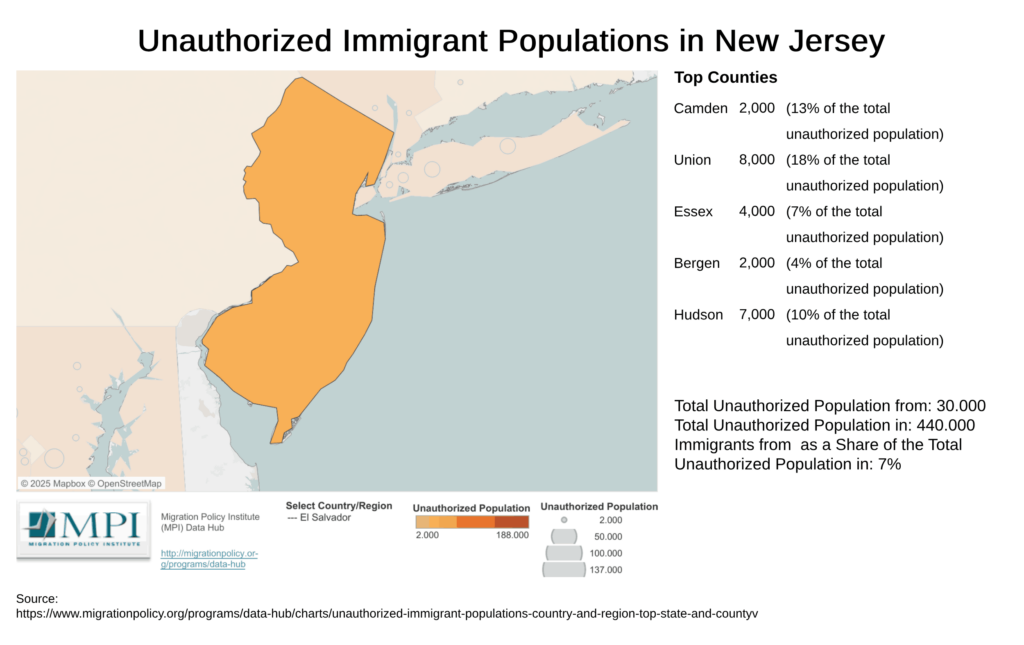
Map showing estimated unauthorized immigrant populations in New Jersey counties, 2018–2022, based on Migration Policy Institute data.
Regarding Salvadorans, the first TPS status dates back to 1990. The 1990 Immigration Act offered TPS to Salvadorans displaced by that country’s civil war, and the first Bush administration granted temporary relief to approximately 190,000 Salvadorans until 1994. Another 80,000 Hondurans and 250,000 Salvadorans also received TPS following Hurricane Mitch in 1998 and two earthquakes in 2001, respectively.
Between 2017 and 2019, the CAP adds, the Trump administration ended TPS designations for six of the 10 countries with designations. These six countries (El Salvador, Haiti, Honduras, Nepal, Nicaragua, and Sudan) represent 98 percent of the nearly 318,000 people currently protected by TPS. It also ended Deferred Departure, a similar program, for certain Liberians in the United States. With these terminations, the lives of these individuals and their families were left in limbo. Several lawsuits challenging these terminations are pending in U.S. courts. In October 2018, the U.S. District Court for the Northern District of California issued a preliminary injunction, temporarily leaving the designations of Sudan, Nicaragua, Haiti, and El Salvador in effect. This means that TPS holders from these four countries can maintain their protection from deportation and work authorization. TPS holders from Honduras and Nepal are not included in this lawsuit, as it was filed before the Trump administration terminated the designations for these two countries.
Per CAP’s analysis, in 2017, an estimated 13,900 people in New Jersey were TPS holders from El Salvador, Honduras, and Haiti. Furthermore, 8,800 children born in this state have parents from these countries with TPS. Also, 5,400 workers in New Jersey are Salvadorans who enjoy TPS status in areas such as manufacturing (18 percent), administrative and support services, and waste management (12.3 percent), and 12.2 percent work in accommodation and food services. If the executive branch’s measures successfully eliminate the benefit, the CAP estimates that $448.3 million of state GDP would be lost annually without Salvadoran workers who have TPS status.
Stories of Belonging: Los Tepesianos
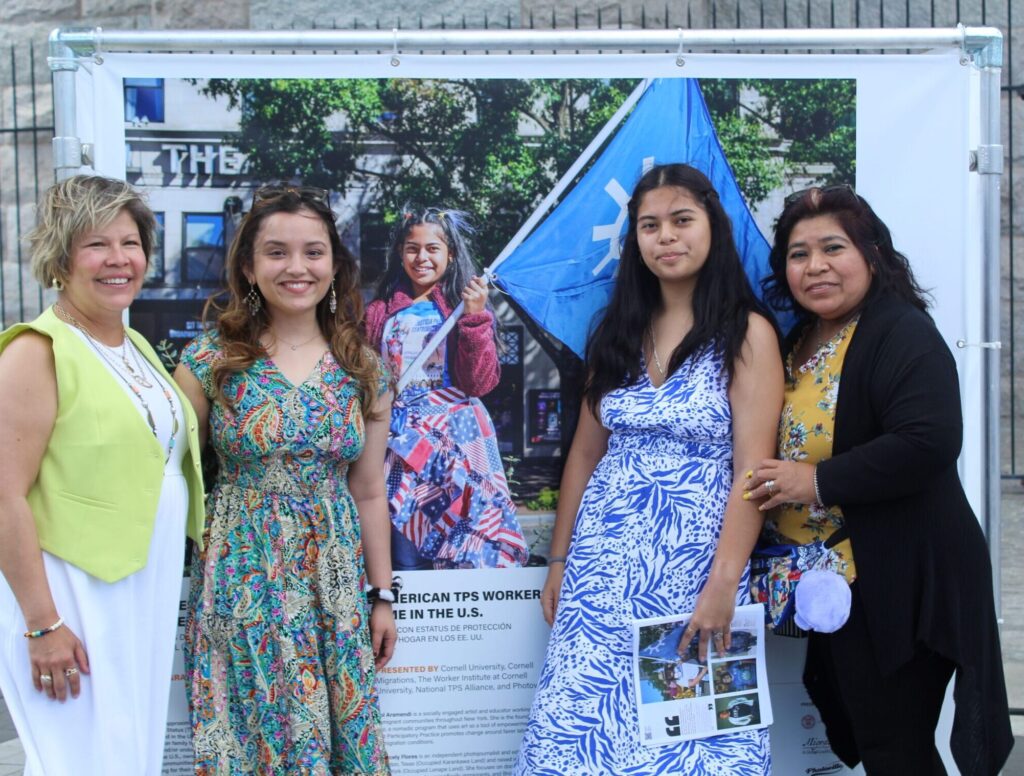
Titled “Not Legal. Not Illegal. Just TPS. Examining the Integration Experience of Central American Immigrants Living Under a Long-Term Regime of Temporality,” Campos-Medina used social movement theory to trace the political activism of the Tepesianos and suggests new model of integration defined as Bounded Integration (BI). BI captures their experience of integration within time limits that confine and restrict their daily lives. Using ethnographic analysis of 29 participant interviews, the study focuses on the assessment of the group’s subjective integration, seeking to understand whether this population has adopted a positive or negative view of their own integration. The findings demonstrate that this group has a positive sense of their own integration and, after many years in legal limbo, has developed a sense of belonging to American culture. Despite their lack of access to citizenship rights, the group members feel they have become Americans.
The study is the sequel to the traveling exhibit “Stories of Belonging: Central American TPS Workers and Their Challenging Struggle to Stay Home in the U.S.,” featuring a collection of photographs, videos, field interviews, and timelines documenting the ongoing struggles for citizenship rights and union organizing faced by more than 325,000 Central American TPS recipients in the U.S. through March 2024. Both the research and the exhibit state that despite their contributions, TPS workers remain at risk of deportation amid political debates.
Salvadorans in Activism, Diplomacy, Literature, and Academia
Blanca Molina, Activist
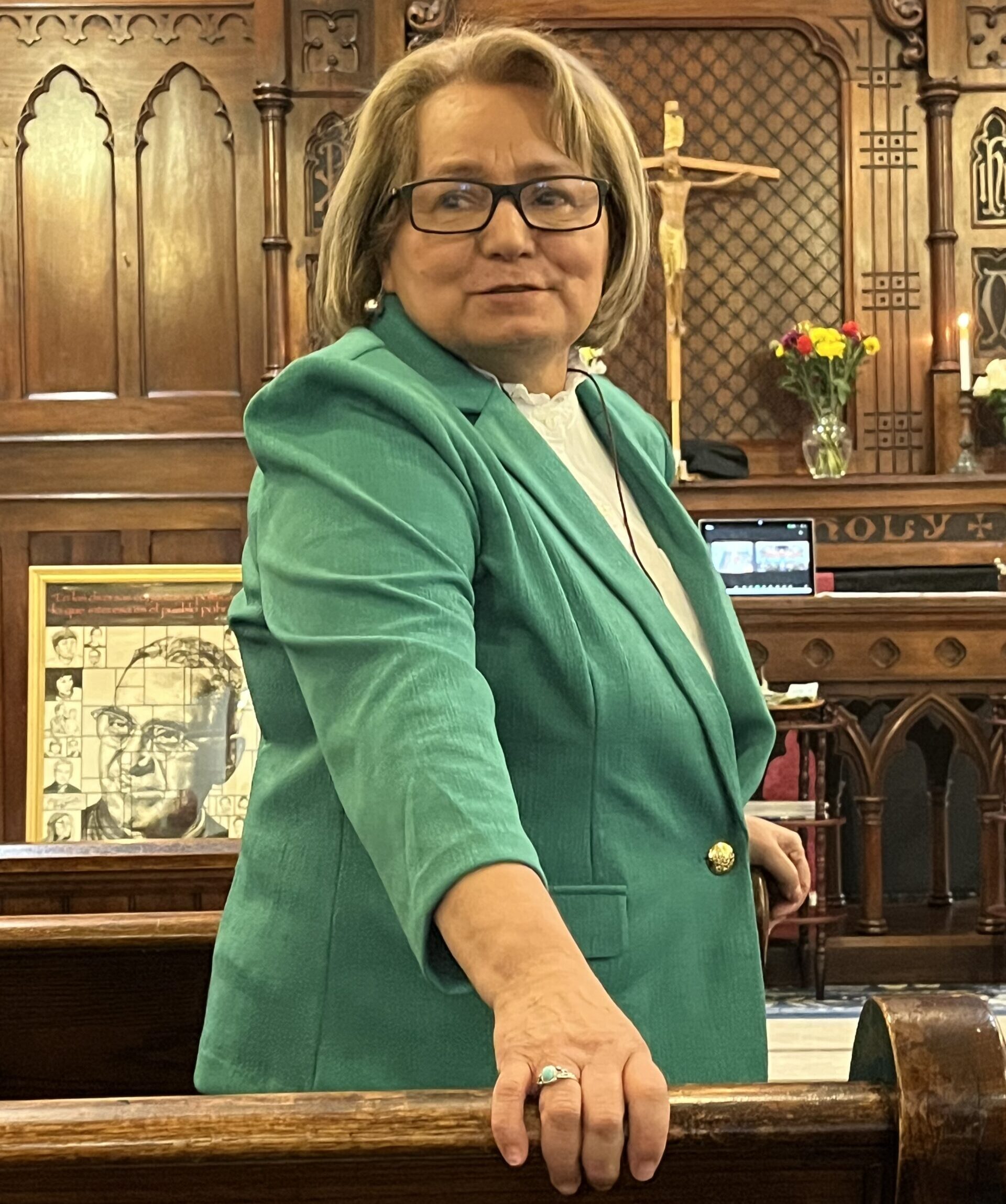
Blanca Molina has served as the executive director of the CEUS Community Center and is one of its founders. She was born in Morazán, El Salvador, and is one of 14 siblings. Blanca studied education at the National University of El Salvador while working with Save the Children in El Salvador and is a certified paralegal. She immigrated to the United States in the early 1990s, fleeing the civil war in El Salvador.
Blanca currently works part-time for CEUS and part-time as a paralegal at American Friends Service Community in New York. In 2012, Blanca’s work was honored with the Russ Berrie Making a Difference Award, one of several awards and distinctions she has received. In 2002, the New York newspaper El Diario named her one of the most distinguished Latinas; The Salvadoran Consulate in New Jersey also recognized her in 2017 for her community work. The Salvadoran government included her among the 100 women who positively impact the lives of the Salvadoran community outside their native country.
Ariel Valle, Former Consul of El Salvador in Elizabeth
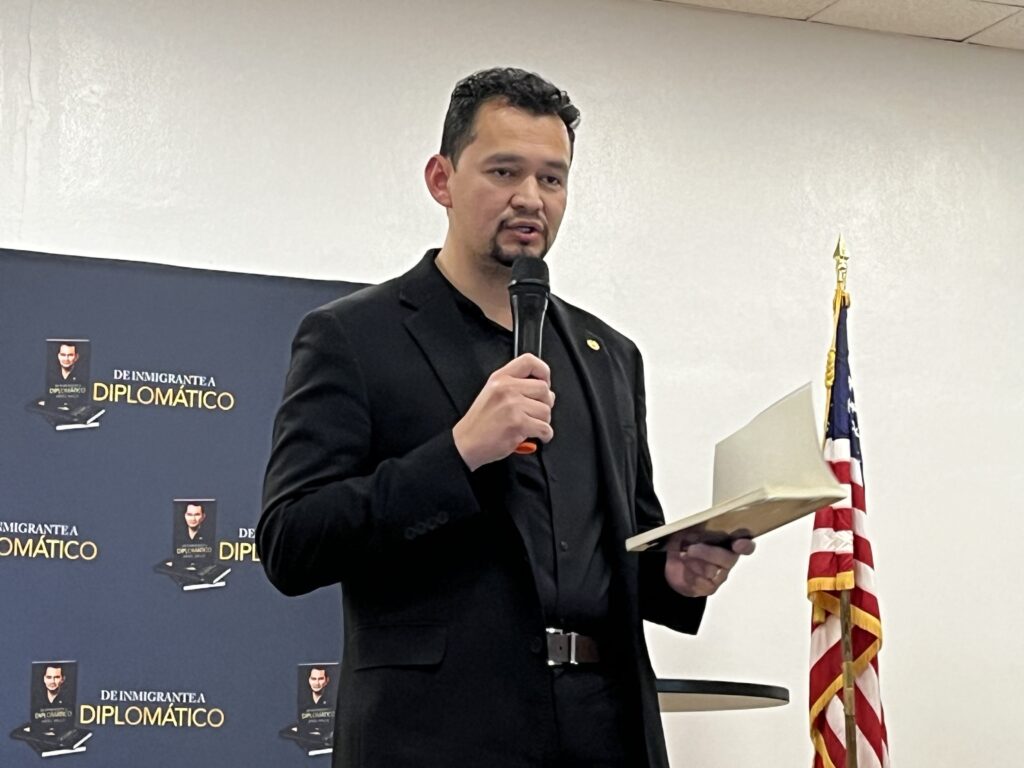
Ariel Valle was born in 1984 in Guarnecia, Texistepeque, Department of Santa Ana. He is one of five children of Francisco Valle and María Victoria Montes, both of rural roots. As a high school student, he decided to migrate with no visa to the United States in 2000, due to the constant threat of gangs.
Valle chronicled his personal and professional experiences in the book “From Immigrant to Diplomat. A Path of Perseverance.” In it, he recounts how, after crossing the border—a 30-day journey—he was taken in by one of his brothers who was already living in Flemington, New Jersey. He also recounts his experience during the trip and his social, educational, and professional adaptation process, explaining how being a TPS beneficiary “has opened many doors and opportunities for him to this day” (p. 63). After completing the necessary courses and training, Valle took office as Consul of El Salvador in Elizabeth City on September 25, 2019. He retired in March of 2025.
José Vicente Chinchilla Vásquez, Former Diplomat, Writer, and Playwright
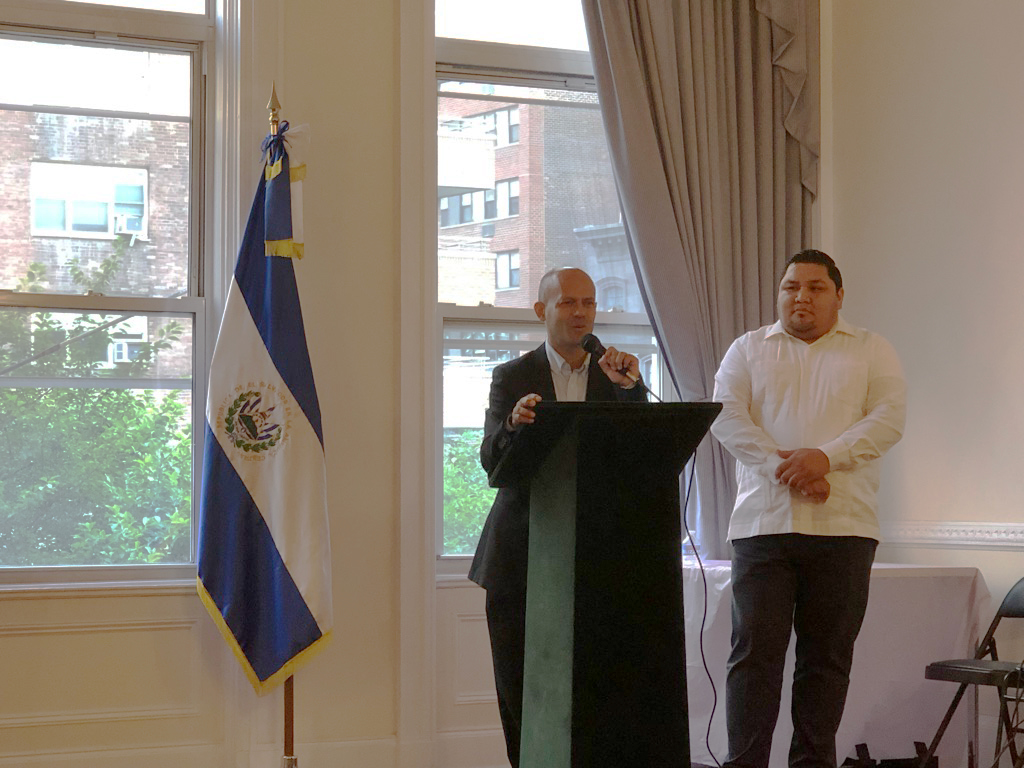
José Vicente Chinchilla Vásquez (left) was born in San Salvador in 1966. He holds a Bachelor’s degree in Economics from the University of El Salvador (UES) in 1999. He holds a Master’s degree in Strategic Communication and Institutional Image from the Rafael Landivar University of Guatemala in 2013. He studied Journalism at the University of El Salvador and served as a Salvadoran diplomat in Guatemala and Honduras, and as Consul General of El Salvador in New York (2017-2019). He currently works as a high school teacher in West New York, New Jersey.
He is a former member of the theater groups La Rendija, the Theater Group of the University of El Salvador (UES), and Cuenterete Teatro. He is the author of the testimonial chronicle “Los Eternos Ilegales,” published by a university press in 2000, and the author of the short story collections “Guantes de Seda” and “Cuando las luciérnagas se ponen sexis,” published by Letramia publishing house (2019 and 2022).
Arianne Álvarez, Fairleigh Dickinson University
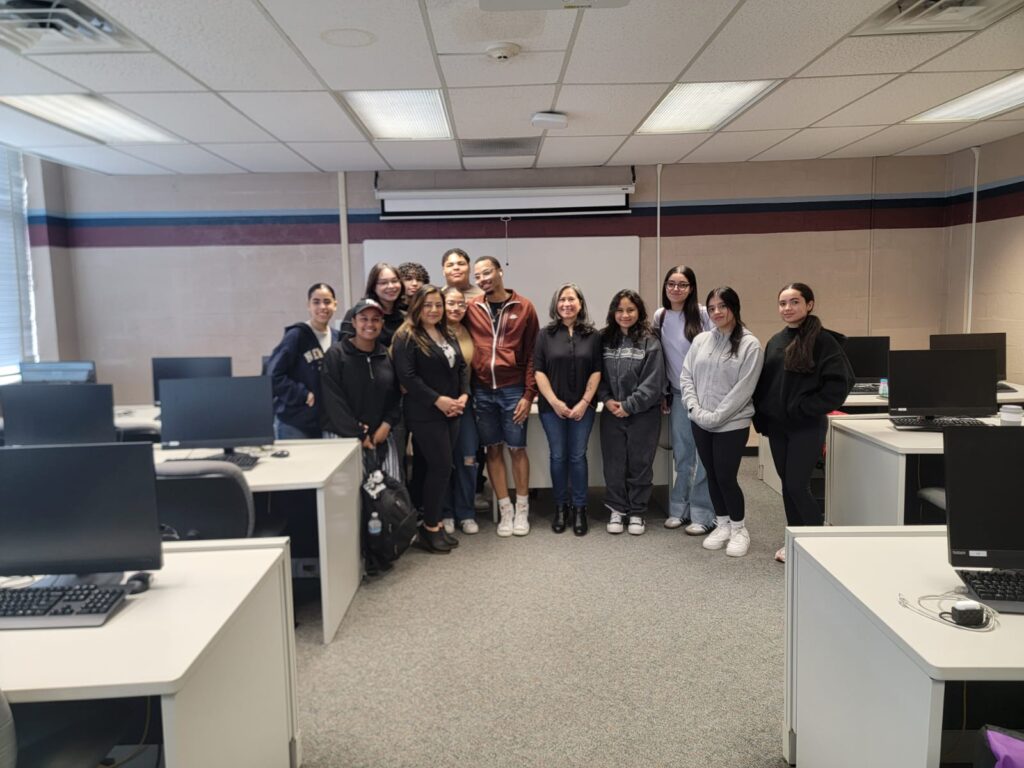
Arianne Alvarez (center left) with students at a Central Jersey high school, where discussions centered on Salvadoran identity, education, and immigrant stories.
Since 2022, Arianne Álvarez has served as the coordinator of the Hispanic Center at Fairleigh Dickinson University.
She was born and raised in the Department of San Miguel. Her maternal family is from the La Morita cantón (a term used in El Salvador to designate small towns), in the district of San Jorge, also in San Miguel, while her paternal family is originally from Albornoz, in the Department of La Unión.
Her journey at Fairleigh Dickinson University began in May 2018, when she began her studies. During her first year, she collaborated in the Puerta al Futuro program office. She will graduate in May 2022 with a Bachelor of Liberal Arts degree, majoring in Psychology.
She recently began teaching Ethics as an adjunct professor, providing insight to Hispanic students on their academic journey.
May 18, 2024, marked a new chapter in her life, as she moved to New Jersey after marrying Eli Robles, who has called this state her home for over 30 years.
Dr. Patricia Campos-Medina, Activist and Scholar
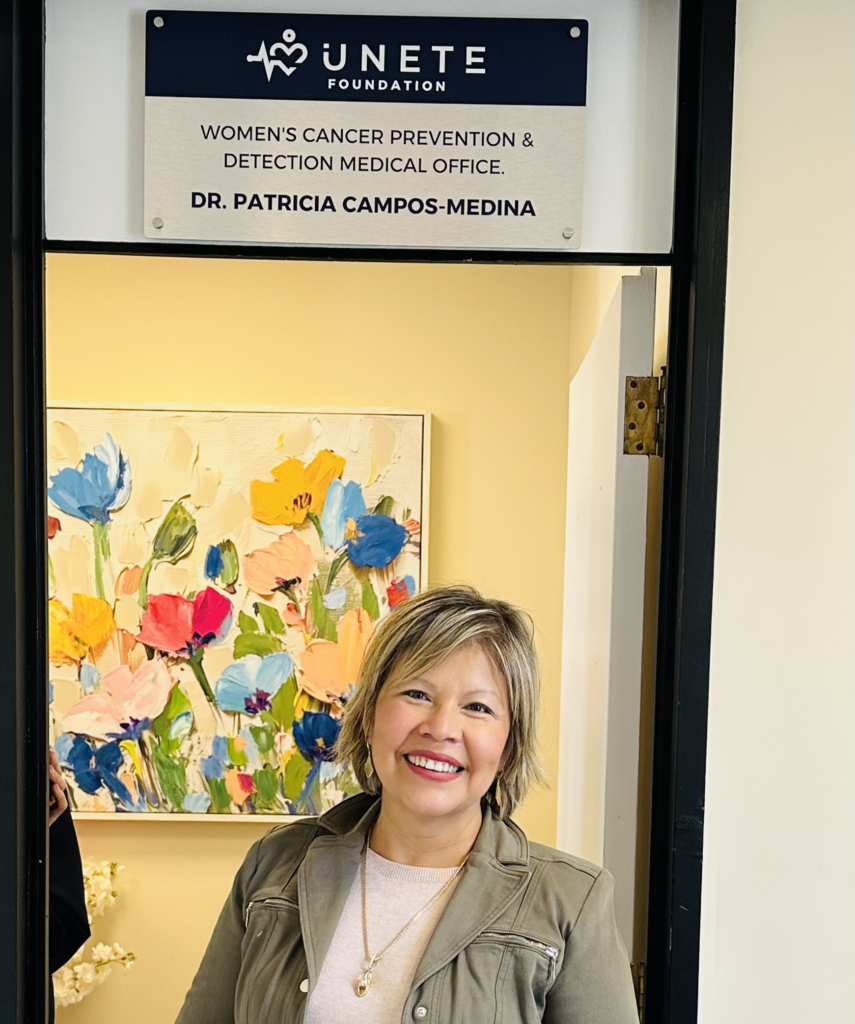
Dr. Patricia Campos-Medina at the UNETE Foundation’s women’s health clinic, dedicated to cancer prevention and early detection in underserved communities.
Patricia Campos-Medina is a native of San Miguel, New Jersey, who has distinguished herself in activism and politics not only on the East Coast but throughout the United States.
She was born in 1973 in Chirilagua, San Miguel, to a family of farmers. Her path, as she defines it, embodies the essence of the American Dream.
Patricia arrived in the U.S. when she was 14 and entered eighth grade as an English as a Second Language (ESL) student. She worked hard to learn English, excelled academically, and earned a scholarship to Cornell University (New York), where she graduated with a Bachelor of Science in Industrial and Labor Relations, a Master of Public Administration, and later her Ph.D. from Rutgers University.
Patricia is the first Latina in history to officially run and appear on the New Jersey ballot to represent New Jersey in the U.S. Senate in the 2024 Democratic primaries. She placed second with 118,000 votes, behind the winner, Andy Kim.
Fabio Esteban Amador, Archaeologist, Explorer, and Artist

Amador was 12 years old when he emigrated in 1976 to join his mother, amid increasing political instability in El Salvador, and they settled on the Lower East Side. He studied fine arts at the Art Student League of New York and the School of Visual Arts. With dreams of becoming an expedition artist, he studied archaeology at Rutgers University and earned his MA and PhD in Mesoamerican Archaeology from the State University of New York at Buffalo. His doctoral research involved excavating and mapping ancient Maya settlements in the Yalahau region of the northern Yucatán Peninsula, seeking clues about how these early societies expressed their identity through art and iconography. Most of his subsequent research has focused on the Mayan regions of El Salvador, Honduras, Guatemala, and the Mexican states of Quintana Roo and Yucatán, along with Cuba and Puerto Rico. In 2016, he launched the Mysteries of the Underworld series in National Geographic. He maintains his studio within the established artistic community in the Neumann Leather Building in Hoboken.
Juber Ayala, Historian and Archivist
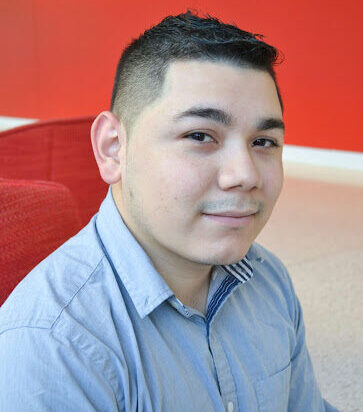
Juber Ayala was born and raised in Newark, New Jersey. He graduated from Science Park High School in 2009. After graduating, he enrolled at Rutgers-Newark. At first, he wasn’t sure what he wanted to study. He always enjoyed learning about U.S. history and decided to take a Latin American history class. After speaking with his professor, she encouraged him to pursue a degree in that subject. He subsequently transferred to the New Brunswick campus during his sophomore year. In 2013, he graduated with a double major in History and a minor in Political Science. During his sophomore year, although Juber knew he wanted to study history, he didn’t know what career path he wanted to pursue. He applied to the Center for Hispanic Policy Research and Development’s summer internship program. He was accepted and placed as an intern at the New Jersey Hispanic Research and Information Center at the Newark Public Library. His supervisor, Yesenia López, introduced him to the archivist profession. He thoroughly enjoyed his experience and remained part-time for the remainder of his undergraduate studies. Juber also worked at the Center for Puerto Rican Studies from 2014 to 2017, under the supervision of Pedro Juan Hernández.
At the urging of his supervisors, Juber enrolled in a Master of Information Science program at Rutgers University, specializing in Archives and Preservation. He graduated in 2019. Juber is currently an archivist at the New Jersey Hispanic Research and Information Center. He hopes to introduce more Latino college students to the fields of libraries and archives. He currently chairs the History and Preservation Section of the New Jersey Library Association.
Victorina Guzmán, Social Worker
Victorina Guzmán is a social worker who has worked for many years in the Plainfield School District of New Jersey.
She emigrated from El Salvador in 1991, she did so to reunite with her mother, Zoila Elías de Montalvo, who first settled in Newark between 1965 and 1966 and again in the early 1970s. She was able to regularize her status while working as a house cleaner and petitioned many of her relatives.
Victorina, who worked for the Attorney General’s Office in El Salvador and held a degree in accounting from the Nuevo Liceo Centroamericano, emigrated in 1991 with her family. While attending university, which she supported by cleaning houses, she began teaching parenting classes at the Newark Military Academy and thus became involved in social work. Having overcome domestic violence herself, part of her experience has helped her understand and help immigrant families facing numerous challenges, guiding them in accessing social services.
Guzmán holds a bachelor’s, master’s, and doctorate in Social Services from Atlantic University, the latter due in 2024.
Julio César Guzmán – El Guanaco Alegre
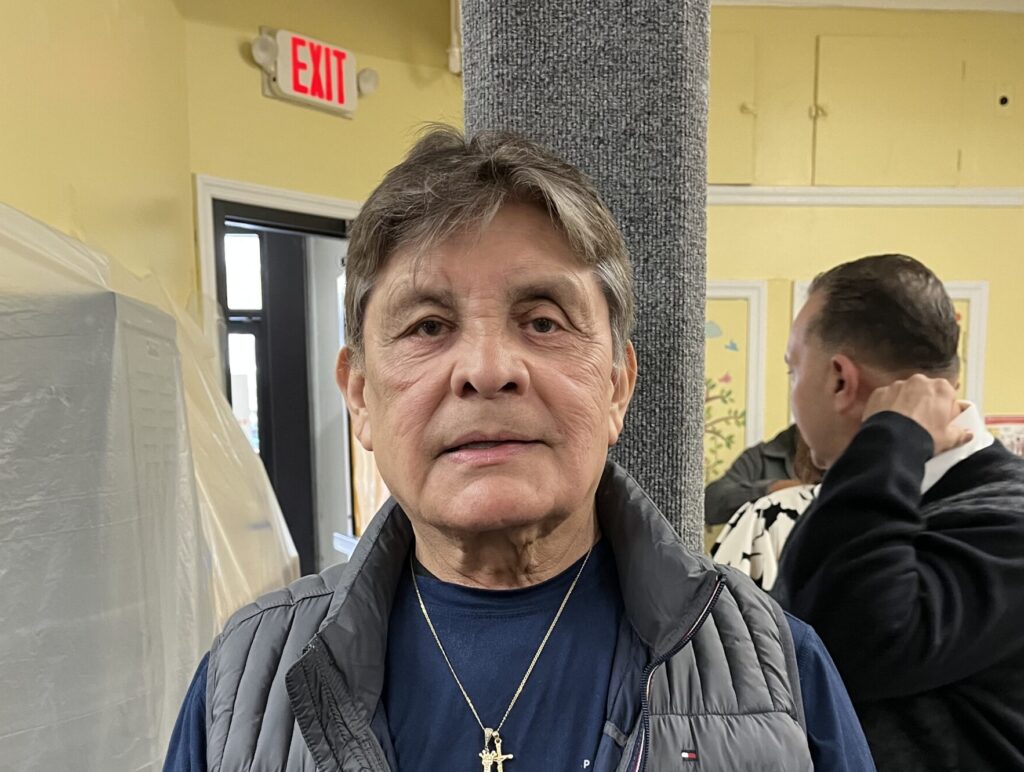
Julio César Guzmán, known as “El Guanaco Alegre,” is a veteran Salvadoran activist and media figure who has lived in New Jersey since the 1970s.
Julio César Guzmán, “El Guanaco Alegre,” is a veteran Salvadoran activist and cultural promoter who has lived in New Jersey for 55 years. He was born in the Department of Usulután in 1944. He has hosted programs such as “Centroamérica Nuestra” on AM radio stations 105.9 FM, 1380, and 9030. He has also appeared on Radio La Voz de Centroamérica, Cablevisión Channel 38, and UHS Channel 44.
José Matías Guardado – Singer-Songwriter
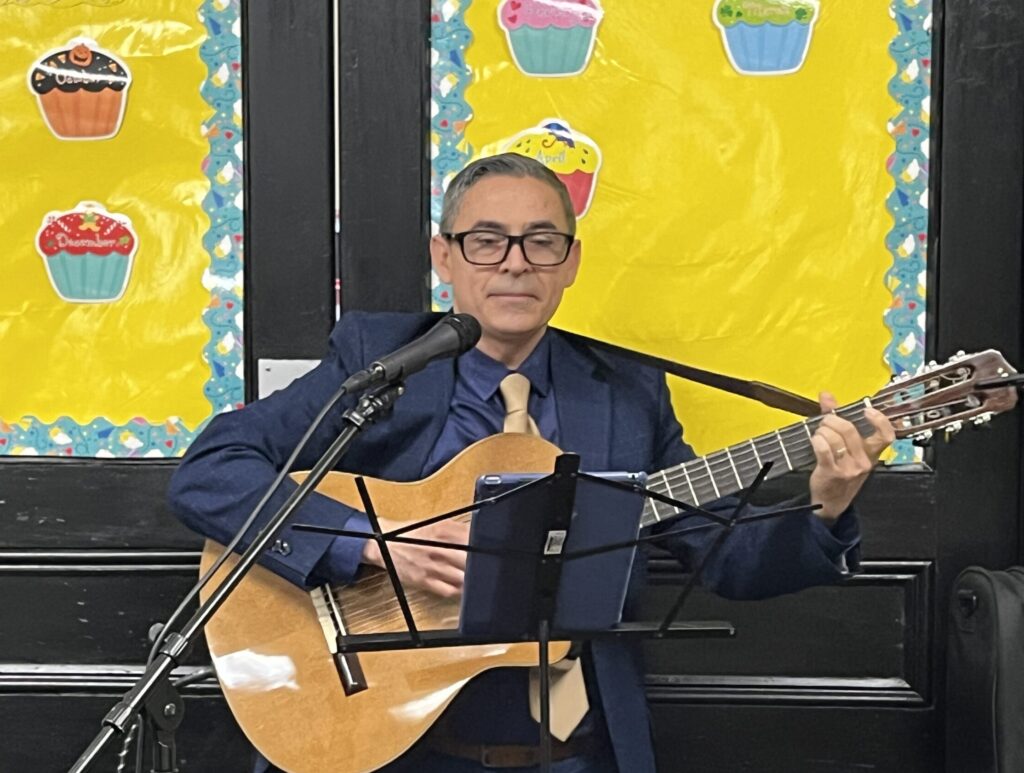
José Matías Guardado, Salvadoran singer-songwriter and actor, performing live in Union City, NJ.
Born in 1975 in Chalatenango, El Salvador, he is the fifth of nine children born to Angélica and Osmín Guardado. Since childhood, he has been passionate about music and the performing arts, especially theater and film. He has worked in numerous theater, musical, and short film projects. In 2009, he was nominated for Best New Actor in a Drama at the ACE Awards in New York for the play “San Salvador Después del Eclipse.” He has won awards for his musical compositions “María Madre de Dios” (1998) and “Juventud Divino Tesoro” (2008). He hosts the “Religion and Spirituality” segment on Studio 42 streaming in Union City, NJ.
Jenny Lozano Rivera y Alex Reyes, fundadores de Coyolito TV
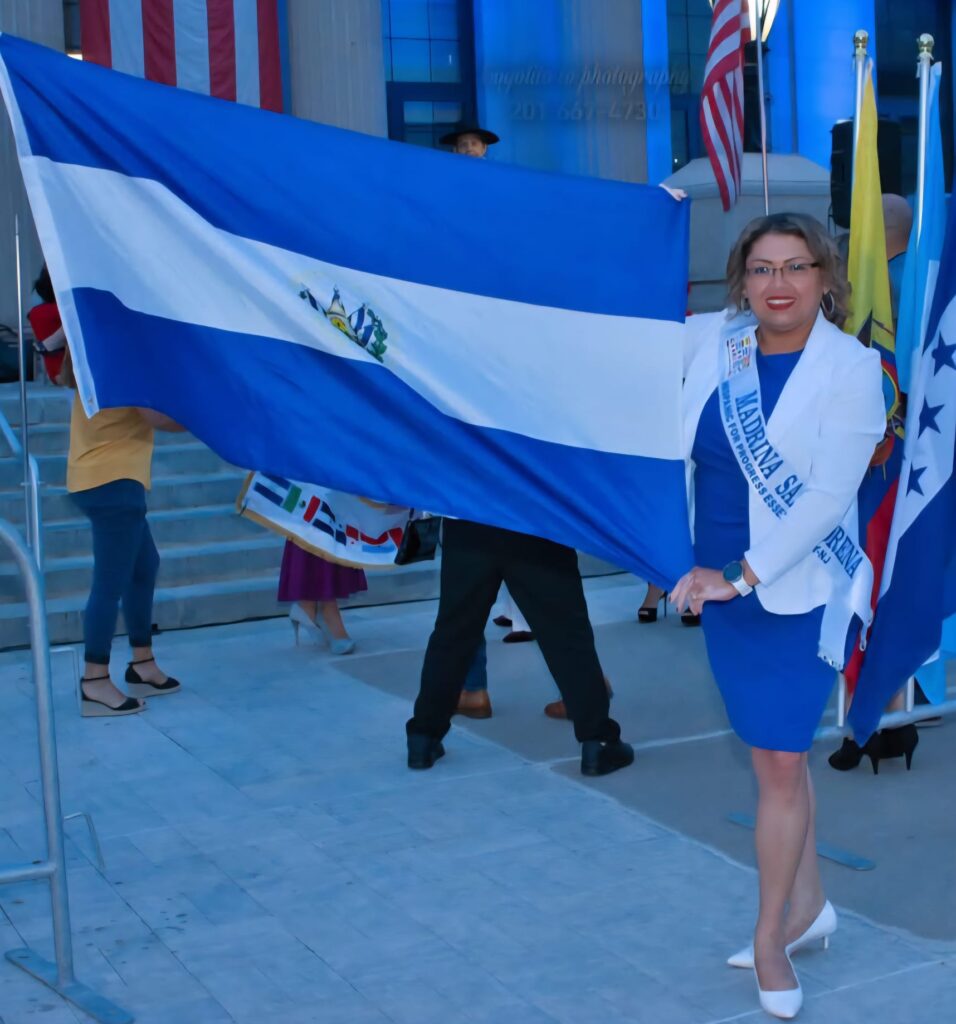
Jenny Lozano Rivera, originally from San Francisco Gotera, Morazán, is a Salvadoran American social worker and co-founder of Coyolito TV.
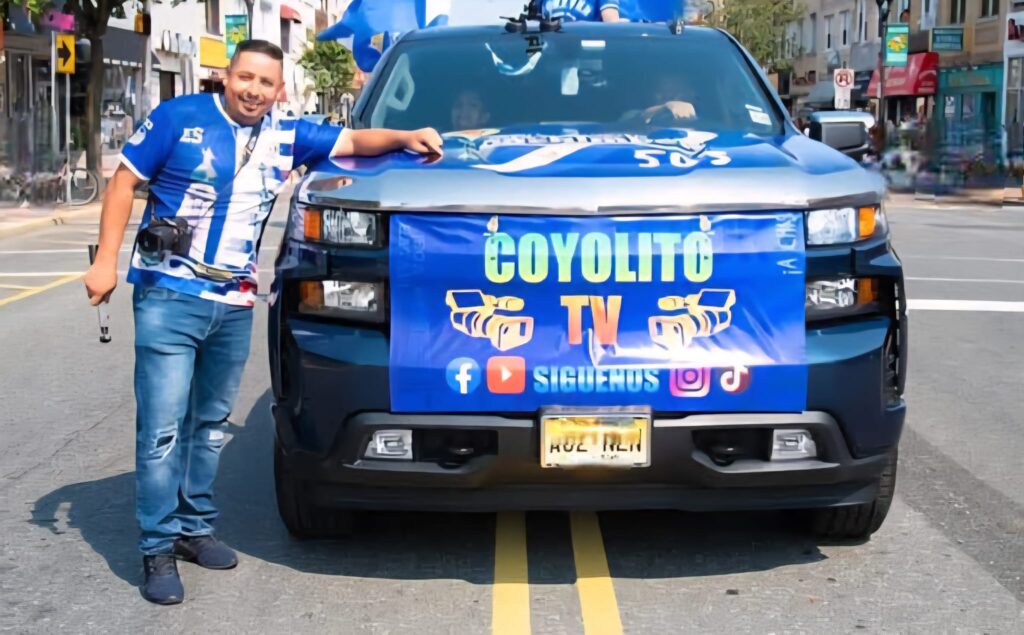
Aley Reyes of Coyolito TV, participating in a community event supporting Salvadoran media creators in the U.S.
Jenny Lozano Rivera, originally from San Francisco Gotera, Morazán Department, and her husband Alex Reyes, from Cerro Coyol, Osicala, Morazán, the founders of Coyolito TV, met in the US in 2014.
Jenny arrived in the US in 1984 (at the age of eight) and has developed a career as a Licensed Social Worker, beginning in Mammoth County and specializing in domestic violence cases. Her husband immigrated as an adult and dedicated himself to computer repair. They married in 2015 and have a daughter.
During the COVID-19 pandemic, Alex created Coyolito TV, an entertainment platform for Latinos in the United States, with a focus on Salvadorans in the diaspora. The content can be accessed on social media platforms such as Facebook and YouTube.
River Gallo, Actor/Director
 River Gallo (they/them), Salvadoran-American GLAAD Award-winning filmmaker, writer, and intersex activist, known for their short film Ponyboi and modeling work with brands like Chromat and Abercrombie & Fitch.
River Gallo (they/them), Salvadoran-American GLAAD Award-winning filmmaker, writer, and intersex activist, known for their short film Ponyboi and modeling work with brands like Chromat and Abercrombie & Fitch.
River Gallo (they/them) is a Salvadoran-American GLAAD Award-winning filmmaker, actor, writer, model, and intersex activist originally from New Jersey. River earned their BFA in Theater from the Experimental Theater Wing of New York University’s Tisch School of the Arts and their MFA in Film and Television Production from the University of Southern California’s School of Cinematic Arts.
Their short film Ponyboi, which they wrote, starred in, and co-directed with Sadé Clacken Joseph, premiered at the 2019 Tribeca Film Festival, executive produced by Stephen Fry and Emma Thompson. The feature film Ponyboi will premiere at the 2024 Sundance Film Festival in the U.S. Dramatic Competition. Directed by Esteban Arango, River wrote, produced, and starred alongside Dylan O’Brien, Victoria Pedretti, Indya Moore, and Emmy Award winner Murray Bartlett. They also starred in the critically acclaimed documentary EVERY BODY, directed by Academy Award-nominated director Julie Cohen.
Prior to their feature film debut, River starred in several short films, a stage production of KING LEAR at the Annenberg Theater in Los Angeles, the Breaking the Binary Theater Festival, and 24 Hour Plays on Broadway in New York. In the commercial arena, River directed commercials for Facebook. River has collaborated and modeled for Abercrombie & Fitch and Crocs, and made their New York Fashion Week debut walking in Chromat’s Fall/Winter 2021 show. For his work in the arts and addressing social justice issues, River was named to the OUT 100, won a GLAAD Rising Star Media Award, and was named one of Indiewire’s 10 LGBTQIA+ Film and TV Creators on the Rise in 2023.
Luis Contreras, Scholar and Researcher
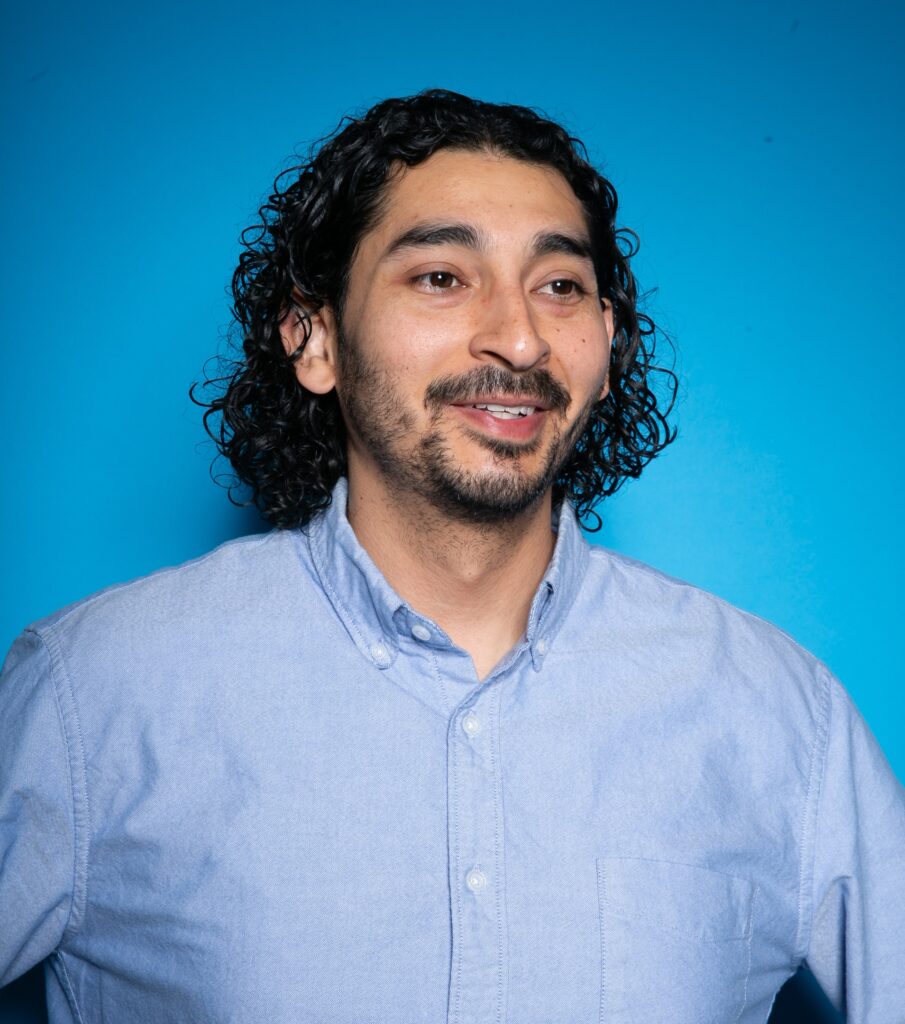
Luis Contreras is a media scholar and ethnographer whose research explores how subcultures adapt and repurpose emerging technologies—from drones and smartphones to algorithmic platforms and VR headsets. Born and raised in Los Angeles to Salvadoran and Colombian parents, Contreras investigates the intersection of media technologies, visual subcultures, and digital infrastructure. His work focuses especially on graffiti writers who deploy analog and digital tools to craft hybrid systems of communication, resistance, and visibility under conditions of surveillance and algorithmic constraint.
Currently pursuing a Ph.D. at Rutgers University’s School of Communication and Information, Contreras’s research advances the concept of “infrastructural folklore”—the informal, tactical knowledge communities develop to navigate both physical urban environments and digital ecosystems. Using digital and in-field ethnography, he studies how creators maneuver through social media platforms, calibrate their posts for maximum visibility, and hack visibility thresholds while resisting platform paternalism. His work draws from platform studies, communication infrastructure theory, and critical media practices to illuminate how graffiti artists and other subcultural practitioners create and circulate meaning across constrained technological environments.
In addition to his academic research, Contreras has taught communication and media studies at both the university and community college level in East Los Angeles, where he is committed to accessible, critical pedagogy. He also served as a storytelling instructor at Snapchat’s Santa Monica headquarters, where he guided creators in using visual narrative tools. His scholarly and teaching work alike remain grounded in an ethic of care, cultural inquiry, and a deep attentiveness to how marginalized communities build visibility, memory, and power through media.
Evelyn Saz, Activist
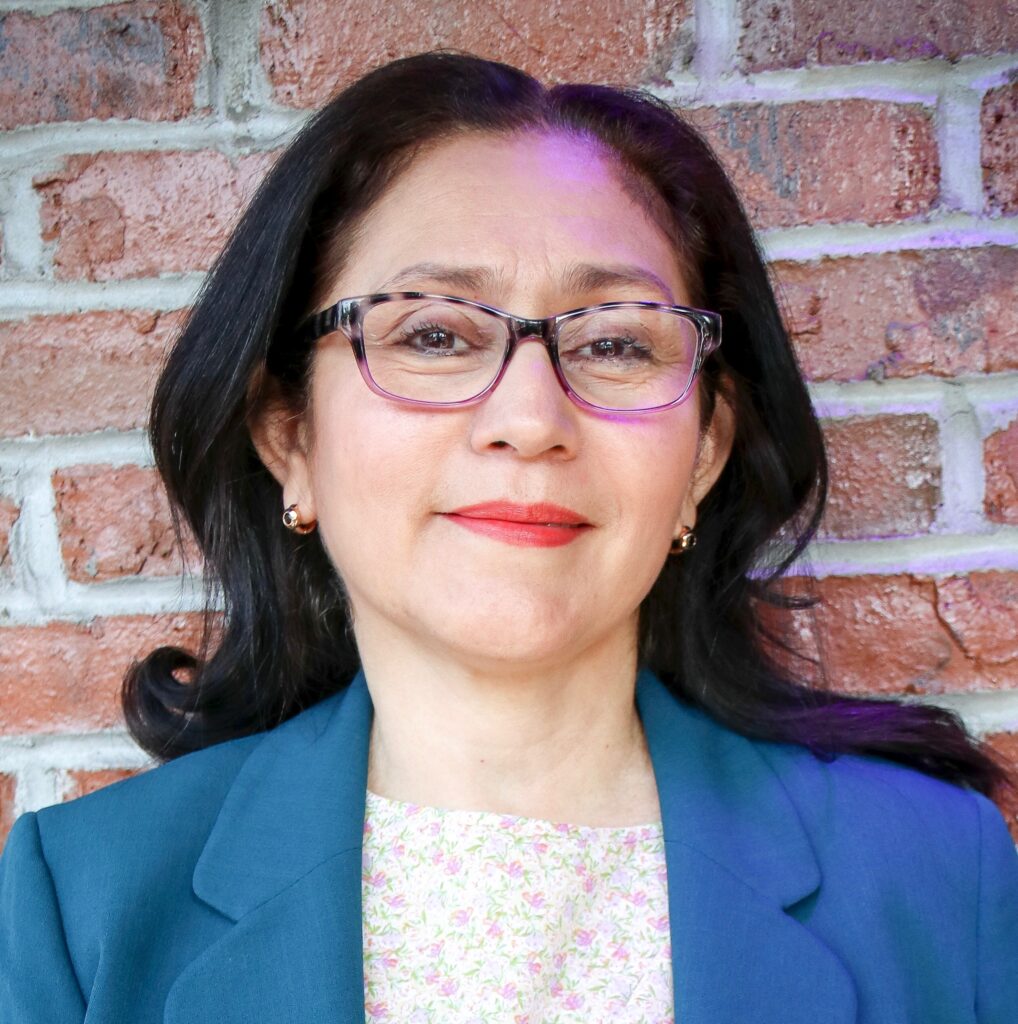
Evelyn Saz at a community event in New Jersey, 2025.
Evelyn Saz was born in El Salvador and immigrated to the United States with her family in 2016. From a young age, she struggled to overcome obstacles and thrive amid the civil war that ravaged her home country. She graduated as a psychologist from the University of El Salvador and currently lives with her two children in Union County, New Jersey.
Between 2016 and 2018, she worked temporarily at the Consulate of El Salvador, supporting the Salvadoran community with Temporary Protected Status (TPS). She subsequently joined the Driver’s License Advocates to help the undocumented immigrant community obtain driver’s licenses in New Jersey.
For three years, she worked as a home health care provider, caring for people with disabilities and older adults. During that time, she realized that there were no labor rights or benefits for domestic workers, which motivated her to fight for their rights. Initially, she joined the National Domestic Workers Alliance (NDWA) as a volunteer member and later became an organizer.
As an NDWA organizer, she fought alongside other grassroots organizations to win the Domestic Workers Bill of Rights. In 2024, this bill was signed into law by Governor Phil Murphy and went into effect on July 1 of that year. That same year, she assumed the role of lead organizer and coordinator of the Domestic Workers Coalition, a position she holds to this day.
Evelyn affirms that she will continue to fight for just causes, honoring the teachings of her mother and father. She concludes by saying that domestic workers deserve to be treated with dignity and respect, as without them, many other jobs would not be possible.
Salvadoran Organizations in New Jersey
Centro Comunitario CEUS
The CEUS Community Center (formerly Committee in Union for Salvadorans) is a nonprofit organization formed in Hudson County, New Jersey, in 1993 by four Salvadoran refugees. They wanted to organize their fellow immigrants to fight for legal immigration status and help them integrate into American society. CEUS initially organized the community to participate in marches and protests, calling on the U.S. Congress to grant them refugee status, because many Salvadorans fled their country’s 12-year civil war in which 75,000 people died. The organization also recruited volunteers to teach English as a Second Language classes and started a women’s empowerment group.
CEUS was incorporated in the state of New Jersey in 1995, and the U.S. Internal Revenue Service granted the organization tax-exempt status (501(c)(3)) in 1997. CEUS also added Spanish literacy classes to its educational program for Hispanic immigrants who had not learned to read and write proficiently in their own language, and leadership training workshops. Lobbying Congress to grant legal status to immigrants and advocating for immigrant rights remained central to the organization’s mission.
In 1996, CEUS opened its first office on 42nd Street in Union City, believed to be the first office by Salvadorans for Salvadorans in the state. As the organization expanded, it moved to a larger office in 1998 on 45th Street in Union City. That office was shared with the American Friends Service Committee, which provided immigration legal services to the community, offering legal services at a much lower price than regular attorneys.
When the American Friends Service Committee concluded in 2001 that it could no longer operate the Union City office, CEUS decided it needed to be more proactive in helping immigrants obtain legal status and hired its first part-time attorney. While the group was originally founded to serve Salvadoran immigrants, CEUS changed the name of the office in 2010 to CEUS Community Center to reflect the fact that it serves all immigrants, not just Salvadorans. The organization moved to a new, larger office in 2013, also in Union City.
The Immigration Legal Service program is now CEUS’s largest program, serving more than 1,000 people each year. The organization continues to offer literacy classes in Spanish and English and has served more than 2,500 students over the years. The organization has also sponsored women’s empowerment groups, cultural and social activities, and raised funds to assist the people of El Salvador, especially after natural disasters, including the 2001 earthquakes. CEUS’s is largely funded by fees from its legal clients and language students, along with donations and fundraising events. The group has also received a number of generous grants from foundations, including the Presbyterian Church’s People Self-Development program, the Mott Foundation, the Reso Foundation, and RTS, a Brooklyn-based foundation.
Comité Pro Mejoramiento de Hato Nuevo Residentes en New Jersey
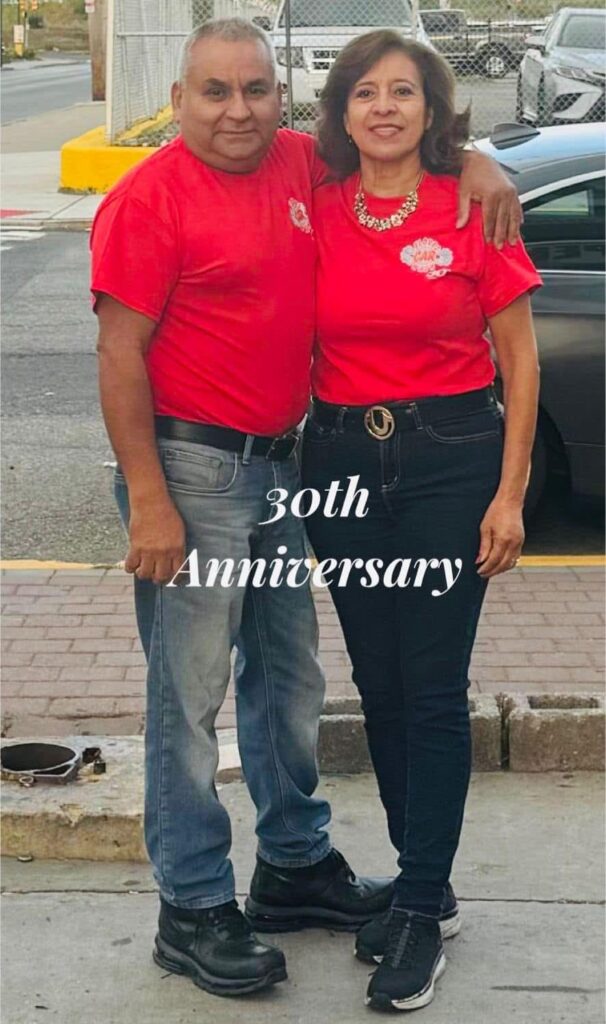
El Comité Pro Mejoramiento de Hato Nuevo Residentes en New Jersey was founded in 1993 by Ana Gladis Flores, a native of Hato Nuevo cantón, San Alejo District, La Unión Sur Municipality, La Unión Department. Flores immigrated to the United States in the 1980s. In 1992, along with her husband, Manuel de Jesús Flores, she founded the company Perfect Novelties Embroidery, and in 1994, they founded Flores Carwash.
Along with other caring individuals from her canton, they have carried out community improvement projects such as paving and signage, installing electric lighting, repairing and equipping the Hato Nuevo Health Unit, the Catholic Church, and the school, as well as installing drinking water, organizing patron saint festivities, and making improvements to benefit Hato Nuevo. Mrs. Flores is also a member of the Board of Directors of the Salvadoran Parade of New Jersey.
Unidos de Corazón Committee – Elizabeth Amaya
The San Miguel Unidos de Corazón Committee was founded nine years ago, as explained by its president, Elizabeth Amaya, in an interview with Delicias TV. The committee has been known for supporting charitable causes such as children with cancer (assisted by the Ayúdame a Vivir Foundation of El Salvador), providing prosthetics, equipping hospitals and nursing homes, and distributing food and coats during the winter to people in need, particularly day laborers who sometimes face homelessness or extreme poverty in communities like Fairview.
Desfile Salvadoreño de New Jersey

The parade runs for 40 blocks along Bergenline Avenue, including 47th Street, which was renamed “El Salvador Boulevard” in 2023. “Our goal is to present Salvadoran culture and customs and leave a legacy for future generations,” Ingrid Echeverría, the president of the organizing committee, told the community newspaper Nuestra Gente.
The parade includes floats, musical bands, and “groups of traditional dances”. It usually begins at Bergenline Avenue and 79th Street and ends at 43rd Street. Parade activities include queen coronations and a gala dinner.
The United Salvadoran Leadership Organization was created in 2004 in New Jersey to support the opening of a Consulate of El Salvador in that state. Once the Consulate opened in 2005, the organization began supporting the consulate and organizing cultural, social, and sporting events. Shortly after, the organization also began assisting other Latino communities in need. Its work focuses on a community food bank, Sunday volunteer service, and community outreach. The president of the organization is Tony Villalobos. The headquarters are located at 527 42nd Street, Union City, NJ 07087.
Comité Cívico El Pulgarcito
The El Pulgarcito Civic Committee is a cultural and charitable organization founded in 2013 by a group led by Andrés Flores. Flores is originally from Hato Nuevo, and settled in the West New York area around 1988. He and other Salvadorans, given the limited presence and representation, decided to participate in the New Jersey Hispanic Heritage Parade. Initially, they joined the then Cuscatlán Organization, founded by Pedro N. (Flores could not remember his last name) and Amalia and Roberto Juárez.
“We have always supported (helping during) natural disasters with donations and have participated in community-related activities such as funerals, repatriations, as well as bringing cultural and folkloric groups to participate in both the Hispanic American and Salvadoran parades,” Flores noted in an interview.
Unidos por Rodeo, Morazán – Javi Flores
https://www.facebook.com/Rodeomorazan.usa
The Unidos por Rodeo Committee directly supports the El Rodeo Festivities Committee, located in Sensembra, Morazán. It is led by Javi Flores.
“Sister” Lutheran Churches
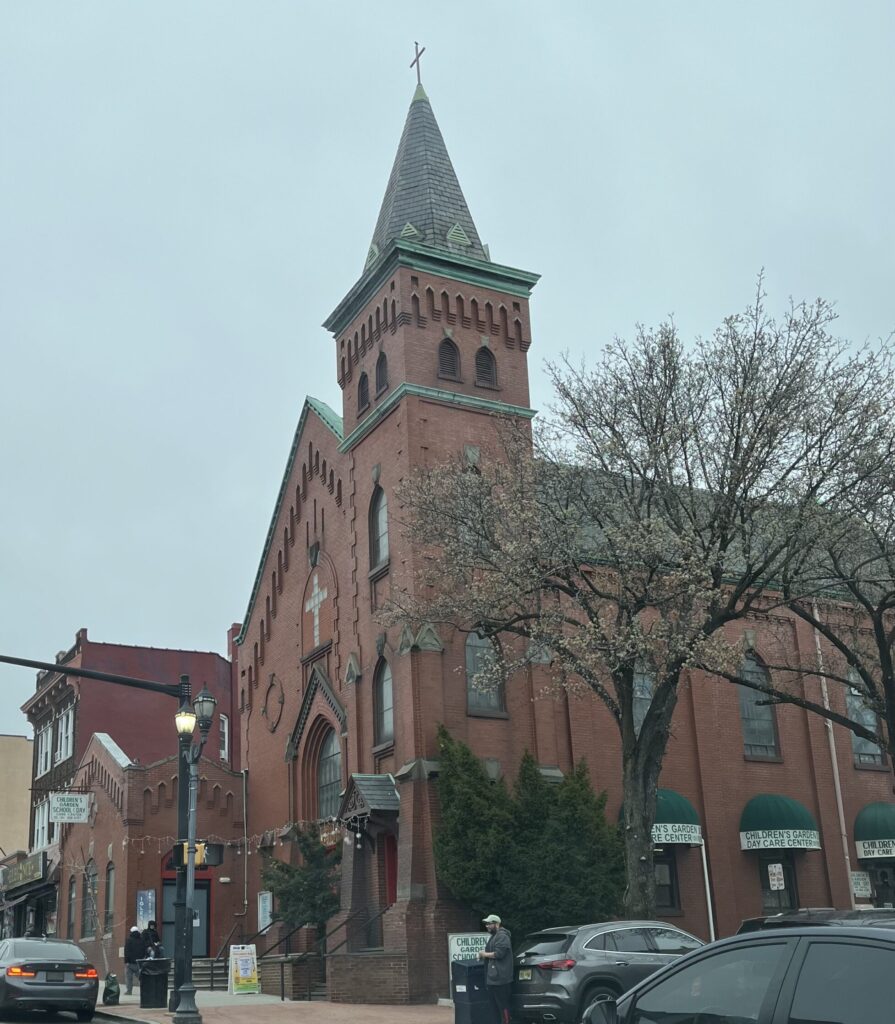
Bergenline is so unique that it has a Migueleño heart: Christ and St. John Lutheran Church (6500 Bergenline Avenue, West New York, NJ 07093), led by Pastor Daniel K. Johansson. The church, with a predominantly immigrant congregation, has a long-standing partnership with two churches, one in Namibia and the other in the Department of San Miguel, El Salvador. This is the Iglesia Divino Redentor (Divine Redeemer Church), led by Reverend Belinda Fernández, whose father, Reverend David Fernández, was murdered by death squads in 1984 and is considered a martyr of the Lutheran Church.
Oral History Interviews
The Plainfield Public Library has an Oral History Collection that includes oral history interviews conducted as part of the StoryCorps Griot, Latinos in Conversation, and Historias initiatives, as well as those recorded for the Voices of Plainfield project. The interview recordings include an audio file and a text transcript.
StoryCorps is a nonprofit organization that conducts oral histories nationwide. These projects ensure the preservation and dignified presentation of the voices, experiences, and life stories of Union County’s African American, Latino, and Hispanic communities. Since 2007, the collection has grown to include more than 36 interviews with local residents of Plainfield and Union County, representing 14 different countries. Many of the interviews were also transcribed with the assistance of a Union County History Grant.
Among the interviews is that of Claudia V. Freire, a Salvadoran. In the 2007 interview, conducted in English, Freire—born in San Salvador in 1976—tells some of her childhood experiences before the start of the war, her own and her family’s experiences as immigrants, and her process of cultural assimilation. Her interview can be reviewed here: https://plainfieldlibrarynj.contentdm.oclc.org/digital/collection/p17109coll15/id/64/rec/25
Likewise, the Newark Public Library included the testimony of Salvadoran Angel Ayala in the Hispanic Reference Collection of the New Jersey Hispanic Research and Information Center (NJHRIC). The interview was conducted in 2018 by Kevin Rosero, and the 40-page transcript is part of the library’s archives.
Ayala is originally from San Miguel and immigrated to the U.S. in 1981 when he was 16. The guerrilla siege of his hometown motivated him to follow in the footsteps of his father and other relatives, who settled in Newark in the late 1970s.
The interview’s transcription is available at the NJHRIC.
Restaurants and Businesses
The social network for business Yelp! showcases the variety of Salvadoran restaurants in Hudson County, reflecting the high concentration of Salvadorans and Central Americans in the area.
Several restaurants and pupuserías are concentrated along the Anderson Avenue axis (Cliffside Park, in Bergen County) and continue along the busy Bergenline Avenue, the same avenue that the Salvadoran Independence Day Parade runs through.
However, there are Salvadoran-owned business shops, law and tax preparer offices, and delivery services in various parts of New Jersey, such as Newark, Orange, and Elizabeth.
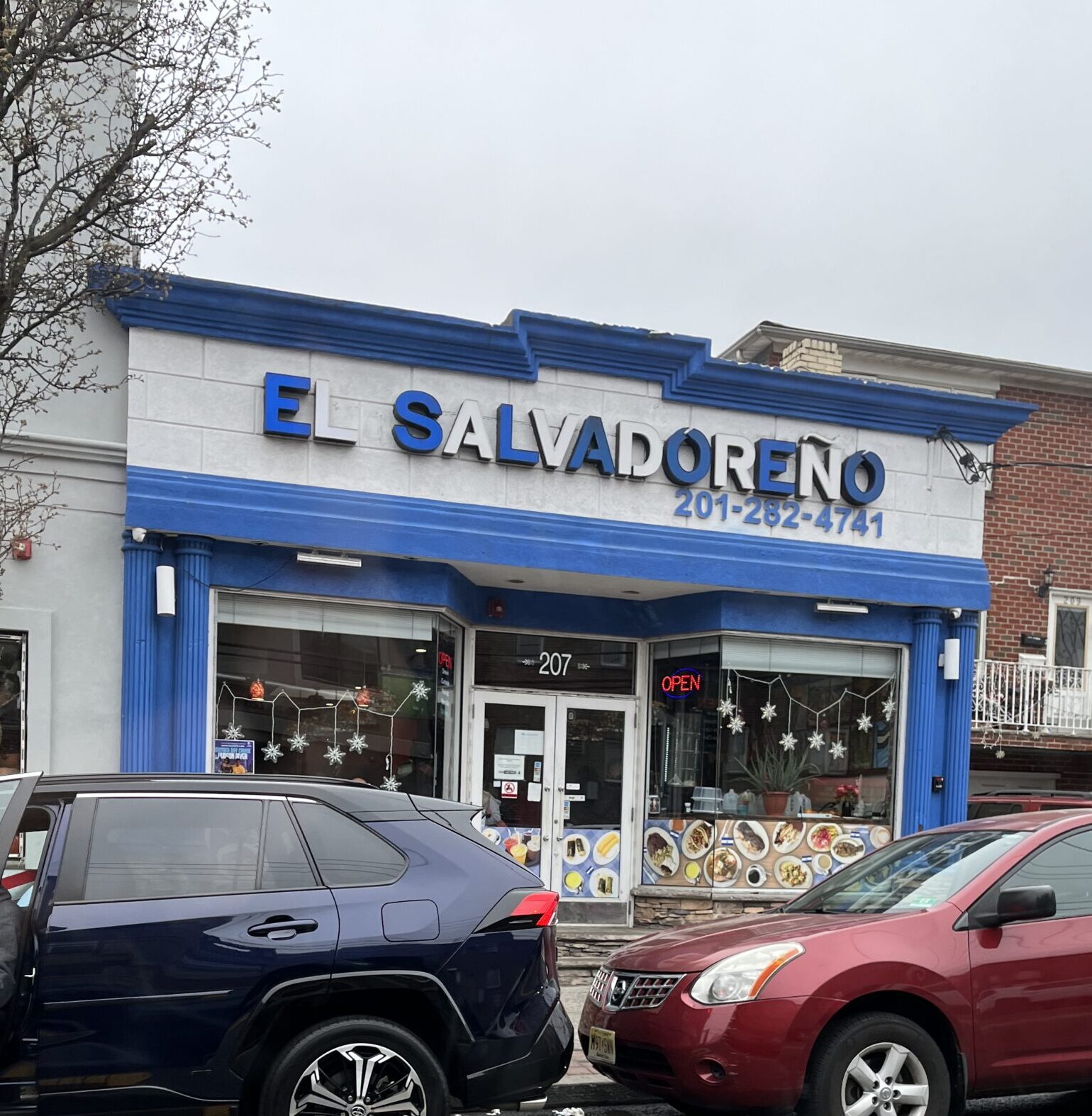
Conclusion
While the Salvadoran presence in New Jersey is geographically scattered, their impact is deeply woven into the state’s social and cultural fabric. Yet, the community continues to face significant challenges, particularly related to immigration status, economic hardship, and limited access to public resources. Despite these obstacles, Salvadorans have demonstrated resilience, perseverance, and a strong sense of identity.
Given the growing importance of this community, academic institutions need to engage more deeply with their experiences.
There is a pressing need for research that documents their history, analyzes their current realities, and informs policy that can better support their needs. By turning scholarly attention to the Salvadoran community in New Jersey, academia can help ensure that their contributions are recognized, their voices amplified, and their challenges more effectively addressed.
Bibliography
- Center for American Progress. “TPS Holders in New Jersey.”
https://www.americanprogress.org/wp-content/uploads/sites/2/2017/10/101717_TPSFactsheet-NJ.pdf - Centro Comunitario CEUS
https://ceusnj.org/about/history/ - Cornell University. “Stories of Belonging: TPS Workers.”
https://www.ilr.cornell.edu/worker-institute/stories-belonging-tps-workers - DATA USA. Bergen County, New Jersey
https://datausa.io/profile/geo/bergen-county-nj - Migration Policy Institute. Profile of the Unauthorized Population: New Jersey
https://www.migrationpolicy.org/data/unauthorized-immigrant-population/state/NJ - Molina-Tamacas, Carmen. SalviYorkers. K ediciones, 2020.
https://linktr.ee/salviyorkers - Newark Public Library. Interview of Angel Ayala, by Kevin Rosero, 8/12/2018.
- Newark Public Library. Latinos Then and Now (2018).
- Newark Public Library. Latinos Then and Now (2018). Co-curated by: Natasha Almánzar-Sánchez, Phil Napoli, and Ana Olivera.
https://npl.org/wp-content/uploads/2018/09/MYNEWARKSTORY30x40travelLatinoThenNow.pdf - Newark Public Library, The Latino Oral History Collection. https://www.npl.org/collections-services/njhric/loh/
- Ministerio de Relaciones Exteriores de El Salvador. “Nueva Jersey cuenta con un ‘El Salvador Boulevard’” (Junio de 2023).
https://rree.gob.sv/new-jersey-cuenta-con-un-el-salvador-boulevard/ - Plainfield Public Library. Oral History Collection. Latinos in Conversation, 2007
https://plainfieldlibrarynj.contentdm.oclc.org/digital/collection/p17109coll15/id/64/rec/25 - Savino, C. “Cornell ILR Hosts ‘Stories of Belonging’ Exhibit on Temporary Protected Status Holders.”
https://cornellsun.com/2024/09/23/cornell-ilr-hosts-stories-of-belonging-exhibit-on-temporary-protected-status-holders/
- Svajlenka, N. “What Do We Know About Immigrants With Temporary Protected Status?”
https://www.americanprogress.org/article/know-immigrants-temporary-protected-status/ - Sweilem, A. – NJ.com. “N.J.’s most and least expensive places to rent.”
https://www.nj.com/realestate-news/2025/03/is-your-county-on-the-list-njs-most-and-least-expensive-places-to-rent.html - Trillo, F. y Ayala, J. “From Havana on the Hudson to Bolívar’s Enclave”, in Latinas/os in New Jersey. Rutgers University Press. 2024. P. 75.
- Tripucka, J. – The Hoboken Girl. “What’s Inside the {Mysterious} Neumann Building?”
https://www.hobokengirl.com/whats-inside-the-mysterious-neumann-building/ - US Census Bureau. QuickFacts – New Jersey
https://www.census.gov/quickfacts/fact/table/NJ/SBO060217 - Valle, A. De inmigrante a diplomático. Un camino de perseverancia. PanHouse, 2024.
- Ward, N. y Batalova, J. Inmigrantes centroamericanos en los Estados Unidos. MPI, 2023.
https://www.migrationpolicy.org/article/inmigrantes-centroamericanos-en-los-estados-unidos-2021#no-autorizados

